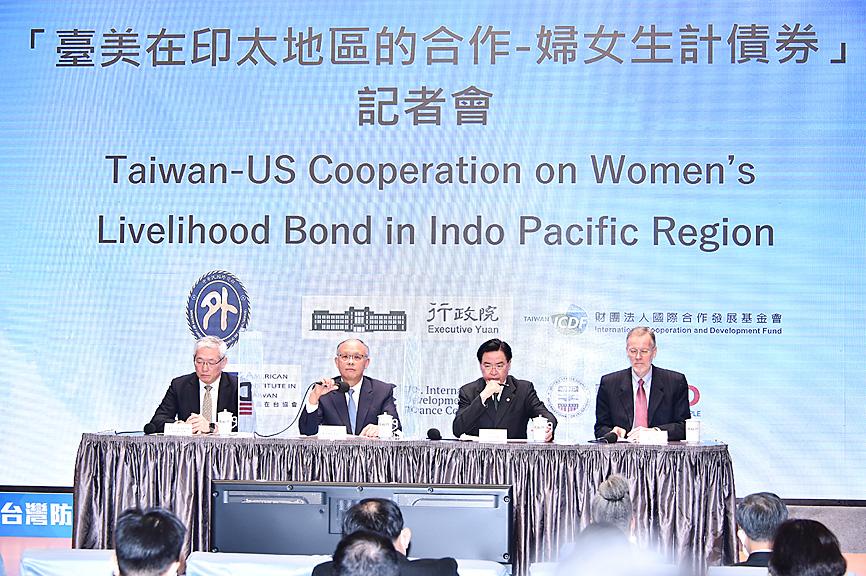Taiwan and the US have teamed up to take part in the Women’s Livelihood Bond 3 (WLB3) initiative — a collaboration that American Institute in Taiwan Director Brent Christensen yesterday touted as “a testament to the United States’ and Taiwan’s commitment to the shared value of promoting women’s development and prosperity.”
The partnership was announced at a news conference at the Executive Yuan in Taipei, with Minister of Foreign Affairs Joseph Wu (吳釗燮), Executive Yuan Minister Without Portfolio John Deng (鄧振中) and International Cooperation and Development Fund (ICDF) Secretary-General Timothy Hsiang (項恬毅) joining Christensen.
Created by the Singapore-based Impact Investment Exchange (IIX), the Women’s Livelihood Bond Series is a series of debt securities to empower women in Southeast Asia by creating sustainable livelihoods, officials said at the event.

Photo: Tu Chien-jung, Taipei Times
WLB3 — the third tranche in the US$150 million four-part initiative — would assist 175,000 to 185,000 female entrepreneurs and socioeconomically disadvantaged women in Indonesia, India, Cambodia and the Philippines by financing loans, marketing and production and living expenses, they said.
Taiwan is participating in the WLB3 as a responsible member of the international community, and to reinforce ties in the region and bolster the government’s New Southbound Policy, as well as strategic cooperation with the US in the Indo-Pacific region, Wu said.
“The US-Taiwan collaboration on the Women’s Livelihood Bond builds upon our existing cooperation on several successful platforms and initiatives, such as the Global Cooperation and Training Framework, the Women’s Economic Empowerment Summit, and our collaboration in APEC,” Christensen said.
“We often describe our relationship with Taiwan with the phrase: ‘Real friends, real progress — zhen pengyou, zhen jinzhan (真朋友,真進展). But this is not just about advancing US-Taiwan ties. It is about like-minded partners standing together to promote common values and shared interests,” he said.
“We are proud to stand with Taiwan and other like-minded partners to promote, support and foster women’s economic empowerment around the world,” he said.
The WLB series exemplifies the new international paradigm of seeing public-private collaboration as a more powerful form of aid to developing countries, Deng said.
WLB3 demonstrates the results of Taiwan-US Infrastructure Finance Framework and Economic Prosperity Partnership Dialogue, he added.
Hsiang hailed WLB3 as a landmark case in the fund’s utilization of innovative financial instruments, adding that the initiative aims to meet the UN’s sustainable development goals.
Against the backdrop of the COVID-19 pandemic, WLB3 microfinancing would encourage female entrepreneurs to engage in domestic manufacturing that breaks the cycle of poverty and fosters economic resilience, he said.
As Taiwanese private investors have yet to take part in the WLB3, the ICDF is inviting them to consider purchasing WLB Series securities, he said.
The ICDF last month signed an agreement with IIX to contribute US$3 million to WLB3’s US$27.7 million debt securities, which closed on Thursday, officials said.
WLB1 raised US$8.5 million, while WLB2 raised US$12 million, they said, adding that the US International Development Finance Corp were among the investors, while Australia provided technical support.

MILITARY BOOST: The procurement was planned after Washington recommended that Taiwan increase its stock of air defense missiles, a defense official said yesterday Taiwan is planning to order an additional four PAC-3 MSE systems and up to 500 missiles in response to an increasing number of missile sites on China’s east coast, a defense official said yesterday. The official, who spoke on condition of anonymity, said that the proposed order would be placed using the defense procurement special budget, adding that about NT$1 trillion (US$32,88 billion) has been allocated for the budget. The proposed acquisition would include launchers, missiles, and a lower tier air and missile defense radar system, they said The procurement was planned after the US military recommended that Taiwan increase

POLITICAL AGENDA: Beijing’s cross-strait Mid-Autumn Festival events are part of a ‘cultural united front’ aimed at promoting unification with Taiwan, academics said Local authorities in China have been inviting Taiwanese to participate in cross-strait Mid-Autumn Festival celebrations centered around ideals of “family and nation,” a move Taiwanese academics said politicizes the holiday to promote the idea of “one family” across the Taiwan Strait. Sources said that China’s Fujian Provincial Government is organizing about 20 cross-strait-themed events in cities including Quanzhou, Nanping, Sanming and Zhangzhou. In Zhangzhou, a festival scheduled for Wednesday is to showcase Minnan-language songs and budaixi (布袋戲) glove puppetry to highlight cultural similarities between Taiwan and the region. Elsewhere, Jiangsu Province is hosting more than 10 similar celebrations in Taizhou, Changzhou, Suzhou,

COGNITIVE WARFARE: Chinese fishing boats transmitting fake identification signals are meant to test Taiwan’s responses to different kinds of perceived incursions, a report said Chinese vessels are transmitting fake signals in Taiwan’s waters as a form of cognitive warfare, testing Taipei’s responses to various types of incursions, a report by the Institute for the Study of War said on Friday. Several Chinese fishing vessels transmitted fake automatic identification system (AIS) signals in Taiwan’s waters last month, with one mimicking a Russian warship and another impersonating a Chinese law enforcement vessel, the report said. Citing data from Starboard Maritime Intelligence, the report said that throughout August and last month, the Chinese fishing boat Minshiyu 06718 (閩獅漁06718) sailed through the Taiwan Strait while intermittently transmitting its own AIS

CHINESE INFILTRATION: Medical logistics is a lifeline during wartime and the reported CCP links of a major logistics company present a national security threat, an expert said The government would bolster its security check system to prevent China from infiltrating the nation’s medical cold chain, a national security official said yesterday. The official, who wished to stay anonymous, made the remarks after the Chinese-language magazine Mirror Media (鏡周刊) reported that Pharma Logistics (嘉里醫藥物流) is in charge of the medical logistics of about half of the nation’s major hospitals, including National Taiwan University Hospital and Taipei Veterans General Hospital. The company’s parent, Kerry TJ Logistics Co (嘉里大榮物流), is associated with the National Committee of the Chinese People’s Political Consultative Conference (CPPCC) and the Chinese People’s Liberation Army (PLA), the